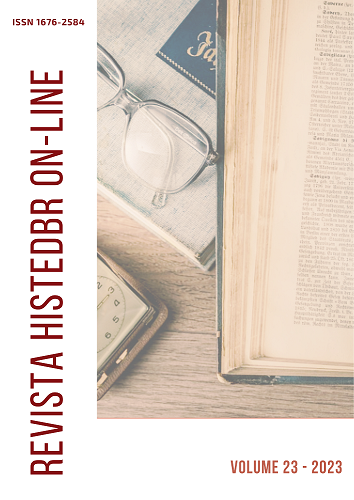Abstract
This article aims to discuss the relationship between cinema in capitalist society and aims to highlight its dialectical dimension and its educational role in the formation of the subjectivity of individuals as a cultural manifestation. Although it is strongly linked to the reproduction of the dominant ideology, serving the maintenance of the current system, it is important to highlight its contradictory character, resulting from the human labor act. In this sense, the cinema brings within itself an emancipatory dimension, focused on the formation of a critical conscience in relation to reality. At first, we establish a dialogue with the authors of “Critical Theory”, Theodor Adorno and Max Horkheimer, who emphasize the alienating dimension of culture in mass society. Next, we present a discussion on aspects of “Cinema Novo” in Brazil, which inaugurated the commitment of cinema to social and political transformation, seeking to show a reality that needed to be modified with the prominent use of elements of Marxist thought. Taking historical-dialectical materialism as a theoretical-methodological reference, we seek to apprehend its dialectical movement and its historical-social particularities, constituted in the midst of class relations between capital and labor.
References
ADORNO, T. W.; HORKHEIMER, M. Dialética do esclarecimento: fragmentos filosóficos. Tradução, Guido Antônio de Almeida. Rio de Janeiro: Zahar, 2006.
ANTUNES, R. O privilégio da servidão: o novo proletariado de serviço na era digital. São Paulo: Boitempo, 2018. Disponível em: https://nestpoa.files.wordpress.com/2019/09/ra-ps.pdf. Acesso em: 10 ago. 2022.
BERNARDET, J. C. O que é cinema. São Paulo: Brasiliense, 1980.
BRAVERMAN, H. Trabalho e capital monopolista. A degradação do trabalho no século XX, Rio de Janeiro. 1987 v. 3.
CARNEIRO, B. B. L. Cinema e educação: a dimensão dialética do cinema e seu papel na formação dos indivíduos, Uberlândia, 2021. Disponível em: https://repositorio.ufu.br/bitstream/123456789/31736/4/CinemaEduca%c3%a7%c3%a3oDimens%c3%a3o.pdf. Acesso em: 19 jul. 2022.
COELHO, T. O que é indústria cultural. 35. ed. São Paulo: Brasiliense, 1993. (Coleção Primeiros Passos). Disponível em: https://www.professores.uff.br/jacquelineribeiro/wp-content/uploads/sites/77/2019/10/09.-COELHO-O-que-%C3%A9-ind%C3%BAstria-cultural.pdf. Acesso em: 07 ago. 2022.
COSTA, A. Compreender o cinema. Tradução: Nilson Moulin Louzada; Revisão Técnica: Sheila Shvarzman. 3. ed. São Paulo: Globo, 2003.
DUARTE, R. Cinema & educação. Belo Horizonte, MG. Autêntica, 2002.
DUARTE, R.; ALEGRIA, J. Formação Estética Audiovisual: um outro olhar para o cinema a partir da educação. Revista Educação e Realidade, ed. 33, v. 1, p. 59-80, jan./jun. 2008. Disponível em: https://seer.ufrgs.br/index.php/educacaoerealidade/article/view/6687. Acesso em: 10 set. 2022.
FRANÇA, L. B. A cinemateca educacional de Henry Ford e o projeto de sociabilidade fordista. Aurora: Revista de Arte, Mídia e Política, São Paulos, v. 9, n. 26, p. 58-74, jun./set. 2016. Disponível em: https://revistas.pucsp.br/index.php/aurora/article/view/27495/22201. Acesso em: 20 set. 2022.
GRAMSCI, A. Cadernos do cárcere. Temas de Cultura. Ação Católica. Americanismo e Fordismo. Tradução: Carlos Nelson Coutinho e Luiz Sérgio Henriques. Rio de Janeiro: Civilização Brasileira, 2001.
HARVEY, D. Condição pós-moderna. Tradução: Adail Ubirajara Sobral e Maria Stela Gonçalves. 17. ed. São Paulo, SP: Loyola, 2008.
MARX, K. Manuscritos econômico-filosóficos; tradução: Jesus Ranieri. – [4 reimp]. – São Paulo, Boitempo, 2010.
MÉSZÁROS, I. A educação para além do capital. Tradução: Isa Tavares. 2. ed. São Paulo, Boitempo, 2008.
MÉSZÁROS, I. A teoria da alienação em Marx. Tradução Nélio Schneider. 1. ed. São Paulo: Boitempo, 2016.
MÉSZÁROS, I. O poder da ideologia. Tradução Magda Lopes e Paulo Cezar Castanheira. 1. ed. 5 reimp. São Paulo: Boitempo, 2014. p. 566-566.
OLIVEIRA, J. ‘Indústria Americana’ bate ‘Democracia em Vertigem’ e leva Oscar de Melhor Documentário. Longa de Petra Costa perde para o longa produzido pela Netflix e pelo casal Obama. El País, São Paulo, 09, feb. 2020. Disponível em: https://brasil.elpais.com/cultura/2020-02-10/american-factory-bate-democracia-em-vertigem-e-leva-oscar-de-melhor-documentario.html. Acesso em: 20 nov. 2022.
OS VINGADORES. Direção: Joss Whedon. Produtores: Jon Favreau, Kevin Feige, Louis D’Esposito, Victória Alonso. Estados Unidos. Produtora: Marvel Studios, Walt Disney Pictures, Walt Disney Studios Motion Pictures, 2012. 142 min.
PREVITALI, F. S.; FAGIANI C. C.; GIL, A. D.; LUCENA, C. A. Educação e cinema: formação política e prática pedagógica junto aos movimentos sociais populares do campo. Revista HISTEDBR Online, Campinas, n. 50 (especial), p. 161-178, maio 2013. Disponível em: https://periodicos.sbu.unicamp.br/ojs/index.php/histedbr/article/view/8640300. Acesso em: 05 set. 2022.
RODRIGUES, N. Adeus meninos: um discurso contra o esquecimento. In: TEIXEIRA, I. A. C.; LOPES, J. S. (org.). A escola vai ao cinema. Belo Horizonte: Autêntica. 2003. p. 27- 48.
SAVIANI, D. Trabalho e educação: fundamentos ontológicos e históricos. Revista Brasileira de Educação, v. 12, n. 34, jan./abr. 2007. Disponível em: https://www.scielo.br/j/rbedu/a/wBnPGNkvstzMTLYkmXdrkWP/?format=pdf&lang=pt Acesso em: 20 out. 2022.
SILVA NETO, M. R. O universo cinematográfico da Marvel como fonte de soft power dos Estados Unidos da América, 2018. Disponível em: https://repositorio.ufu.br/bitstream/123456789/24079/1/UniversCinematogr%c3%a1ficoMarvel.pdf. Acesso em: 05 nov. 2022.
TURNER, G. Cinema como prática social. Tradução: Mauro Silva, São Paulo -SP, Summus, 1997.

This work is licensed under a Creative Commons Attribution-NonCommercial 4.0 International License.
Copyright (c) 2023 Bruna Carneiro; Fabiane Previtali; Cílson Fagiani; Sérgio Morais


